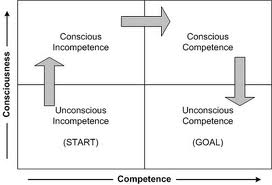
When organizations are planning to introduce some kind of change into their system – structural change, new technology, new leadership, the merging in of an acquisition – planning for the implementation is key, right?
Usually a change management model is chosen on which to build the process, and there are lots of them:
- Bridges
- Kotter
- McKinsey Seven S
- Lewin
- Nadler Tushman
Each of these models places an extreme value on communication. And rightfully so. Most experts advise that when you think you have communicated enough about change…communicate some more. Not bad advice.
But the advice that almost every model neglects is this: spend more time training than communicating; spend more money on training than on communication; spend more leadership time and energy in training than in being visible; spend more innovation on training than on well, innovation.
Here’s the deal: adults like to be competent. It’s important to them. It’s motivating because it generates feelings of mastery and gives the sense of control. When you introduce change that suddenly makes them incompetent, productivity plummets. When you make them incompetent, morale decreases. When you make them incompetent, turnover increases. When you make them incompetent and don’t give them a fast path to competence, your change management process is sunk.
Burch’s work for GTI that identifies the pathway from unconscious or conscious incompetence to unconscious or conscious competence ought to be at the heart of any change management process. You want your employees to adopt your new technology solution? Be sure your change management process focuses primarily on moving your employees out of conscious incompetence to conscious competence ASAP.
Because guess what? Communication doesn’t cure incompetence. Telling doesn’t change behavior, training changes behavior. So change management plans that focus more on communication than training don’t achieve the desired adoption outcomes.
All but the most change hardy in your workforce – that small percentage of Early Adopters – will resist changing because being competent is everything. And that old technology solution you decided to replace? Well, everyone was competent on it. And now, with the decision to move to a Cloud-based, mobile-enabled, SaaS solution, you’ve made them all incompetent.
So help them out. Communicate like crazy. And get the C-Suite involved.
But spend every waking minute ensuring that that training on the new solution is available 24/7. That it’s available in classrooms and webinars. In every language your workforce speaks. In every location your workforce reports to duty. During every shift your workforce works. Multiple times. Let your employees participate in the training more than once. Make it easy and convenient to get competent.
And when the project goes long and over budget, don’t you dare touch the training budget. In fact, if it goes long and over budget, increase the training budget.
Because competence is the enemy of change.






Pingback: Switch | Hamlet to Globe
Pingback: Competence: Enemy of Change? | alto TalentedHR
Pingback: Competence: Enemy of Change? | altoconsulting
Pingback: How long does it take to change culture? « Business Technology Partner
Pingback: Switch – Book Review
Important emphasis on training! I recently learned that only 30% of change initiatives are actually successful. We know that communications is king when working through change, but what is the real role of training? @RahiDelvi and I were discussing this and identified the need for a robust training plan that not only includes core curriculum/instruction, but encompasses “selling” the idea/system, rapidly deploying new versions that respond to real world feedback, and identifying the early adopters/advocates as key to a sustainable system.
Pingback: #NextChat: Change Management |
Pingback: Competence: Enemy of Change? | Mobilizing People | Scoop.it
Pingback: Competence: Enemy of Change? | ...» Talented HR
Pingback: Competence: Enemy of Change? | Talented HR | Scoop.it
Great post – and you can take China’s thoughts one step further and see how if achieving individual and group competence in new behaviors & practices brings the desired results, an organization can be on the first step of a culture shift process.